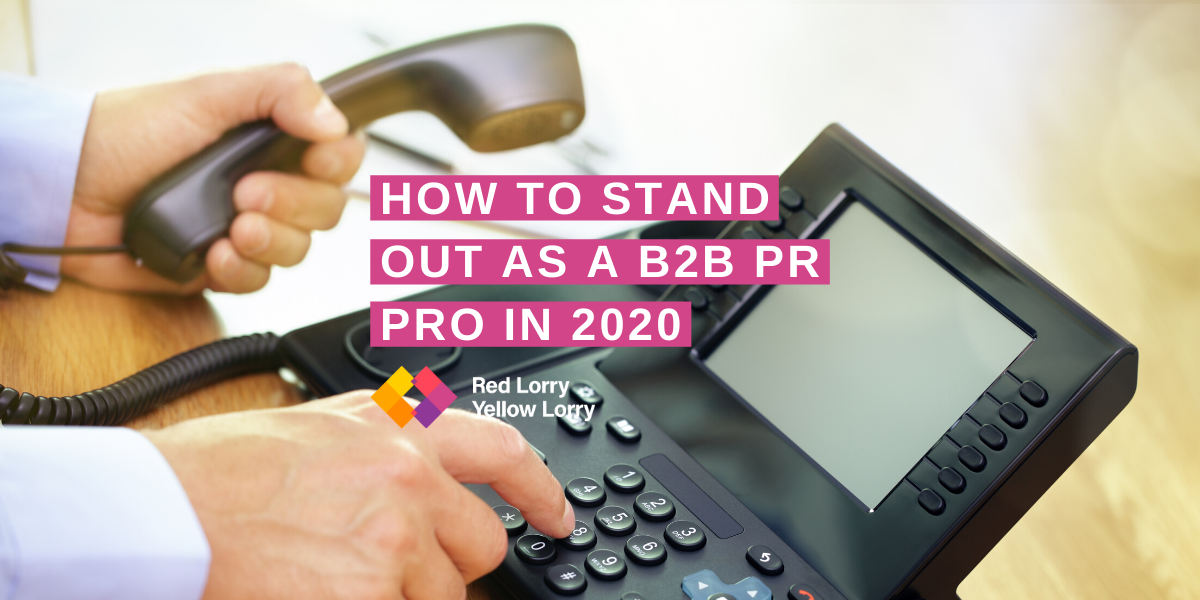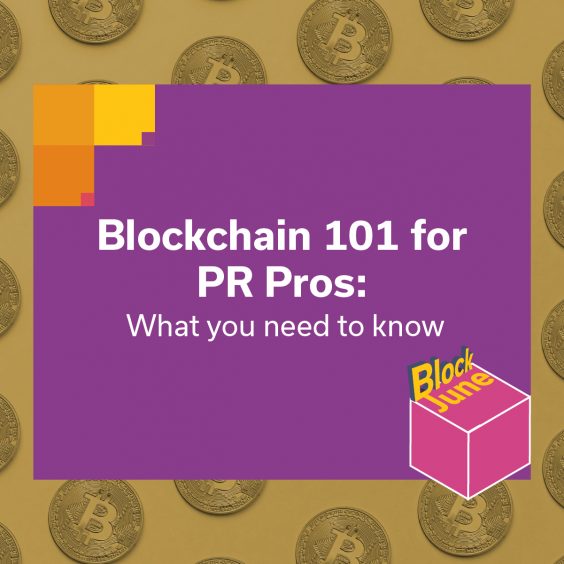If you’re looking to start a career in B2B public relations, it’s critical to understand the vast range of skills you’ll need to make an impact from day one. Luckily for you, we have a team of seasoned PR pro’s who are willing to pull back the curtain and give you the inside scoop on what it takes to be successful in this line of work. We asked some of our senior employees what they see as being the most important skills and attributes for those who are just dipping their toes into the B2B space, and this is what they had to say:
What skills and attributes are most important for B2B PR account coordinators/account executives to have?
“Organization is essential. But while sticking religiously to a to-do list can make us more efficient, day-to-day PR is unpredictable and fast-paced. ACs/AEs must have the ability to be flexible and adapt to whichever scenario or task is at hand. If they can do this while keeping on top of their to-do list, then it’s a win-win situation.”
Rebecca Burgess, Senior Account Executive
“Definitely someone who is personable and has good organization skills. In our line of work, we juggle a lot of things at once, so being able to keep up and stay on track is important.”
Tanya Roberts, Senior Account Manager
“A curious mind, a willingness to learn, and attention to detail! Although I’d say these are the same for anyone in PR!”
Francesca D’Arcy-Orga, Account Manager
“Have strong sense of team spirit, be reliable and be hardworking – you can learn everything else.”
Antonia Fagbohun, Account Manager

What tips would you give to an AC/AE for tracking activity/managing deadlines?
“Once you’ve found your groove and know where everything lives, treat each project as a step-by-step process. Ask yourself what the next step is, and the step after that, and so forth. Not only do you then learn how long this task will take so you can better manage your time, but it also gives you the peace of mind that nothing will fall through the gaps.”
Rebecca Burgess, Senior Account Executive
“A deadline is one of the first things you should identify when working on a project. Think about it – without a deadline, you can’t plan next steps or the timing of a project. Knowing the deadline will also be important when prioritizing tasks and will help keep you on top of projects.”
Tanya Roberts, Senior Account Manager
“As someone who wasn’t naturally organized, I found talking to other people in the office and on my accounts really helpful. Everyone’s been in your shoes and loads of people have different tips and tricks for staying organized and on top of everything.
I use a mixture of hand-written lists, calendar markers for important deadlines, and an inbox filing system where I sort emails into two folders: action and archive. If it’s in my actions I know it’s something I need to do, or keep an eye on. Everything that’s for reference or completed goes into archive.”
Francesca D’Arcy-Orga, Account Manager
“It’s important to find what works well for you – whether that is a to-do list or calendar alerts. Ask your manager or other members of the team what works best for them if you’re struggling. The Eisenhower Decision Matrix is a favorite of mine.”
Antonia Fagbohun, Account Manager
What advice would you give to an AC/AE who wants to grow quickly and take on more responsibility?
“To not shy away from responsibility when it comes your way and face it head-on. In an agency set up like ours, we all muck in and learn at a fast rate. We expect AC/AEs to have a can-do attitude as opposed to being fearful when given a project or task. If you’ve been presented the opportunity to take on more responsibility, you’ve already proven that you’re capable. So, grab the wheel and drive!”
Rebecca Burgess, Senior Account Executive
“Let it come naturally, you won’t learn the ropes in a single day. Build on your strengths, ask for feedback on your weaknesses, and offer yourself up no matter the task.”
Philip Iacob, Senior Account Executive
“Be willing to do more than what your job description outlines. Be open to taking on additional projects/tasks and show interest in taking on more responsibility. And ask your manager what you can do to get to the next level.”
Tanya Roberts, Senior Account Manager
“We’re really lucky that we work in an office where you’re encouraged to grow and develop your interests. If there’s something you want to do more of, just ask, and there’s usually a way to make it happen – within reason!
At the same time, you can’t grow unless you’ve got solid foundations in place, so having a good grasp on your role as an AC/AE is crucial to being able to develop further and take on more responsibility.”
Francesca D’arcy-orga, Account Manager
“Master your level’s skillset first, then branch out / look for new opportunities. The team depends on the AC/AE to support them. You do this best by being stellar in your role. Also, don’t ever say “that’s not my job”. A senior team member believes in you – that’s why they’re asking you to work on something outside of your job description. When in doubt, ask questions!! The only dumb ones are the ones that are never asked.”
Kerry Quintiliani, Account Manager
“Be proactive. I’ve noticed that those who ask to help and really get stuck in progress quickly. If there’s a project or task you really want to get involved in speak up and ask!”
Antonia Fagbohun, Account Manager
What advice would you give to help them start building relationships with key media targets in their clients’ industries?
“Introduce yourself to journalists you haven’t spoken to before and offer to meet them in person for a coffee or at a tradeshow. Face-to-face meetings allow journalists to move past the idea that you’re a robot. It’s strange that we have to remind fellow humans that you are also a human, but I suppose that’s just the world we live in…”
Rebecca Burgess, Senior Account Executive
“Call, call, call. Let people hear your voice, be honest and frank about your experience. I’d also advise reaching out to junior journalists; they’re often trying to impress their own editors, and getting that exclusive from you, an embargoed heads up, or a Q&A with a CEO will score you massive brownie points.”
Philip Iacob, Senior Account Executive
“Build a rapport. Email or call them even when you don’t have a pitch just so you can build a relationship. But make sure you have some sort of purpose. Don’t email them to say, ‘hey, how are you doing?’ or ‘how was your weekend?’ But do get to know them. Follow them and interact with them on social media too.”
Tanya Roberts, Senior Account Manager
“Figure out who you want to get to know and read what they write. Maybe comment on an article or like/share a post. Treat it like any relationship – you don’t just jump in with a “I’ll be your best friend!!” mentality. It takes time to cultivate a relationship and build trust.”
Kerry Quintiliani, Account Manager
“When I moved from a general B2B agency with retail, business, and logistics clients to solely B2B tech, I was able to form relationships by emailing journalists with relevant news and becoming a reliable source of information. As our job involves a huge amount of media relations, I think the relationships come naturally, but arranging coffees is a great way to get to know them informally and find out what they’re working on.”
Antonia Fagbohun, Account Manager

What do you count on account coordinators/account executives for the most?
“Everything and anything. But the basics include reporting, up-to-date knowledge of account activity, and an understanding of journalists and their motivations (For example: Who wants a byline on 5G? Who wants to attend IBC? Who’s getting married?).”
Philip Iacob, Senior Account Executive
“Having an AC/AE keep track of the general day-to-day activity of an account is helpful because it then allows me to take a step back to think more strategically, think of new ideas and to focus more on the bigger picture.”
Tanya Roberts, Senior Account Manager
“Being the eyes and ears of the account – they should know what’s going with the client, their competitors, and the wider industry.”
Francesca D’arcy-orga, Account Manager
“Reporting and coming up with fresh and creative ideas! I find ACs and AEs are great assets when it comes to brainstorming due to their out-of-the-box thinking. Even if it’s something we can’t execute, it’s great to hear them and keep it for future reference.”
Antonia Fagbohun, Account Manager

What is one thing you wish a manager/mentor had told you sooner when you were in a more junior position?
“Be original – we’re not practising law here. I wish somebody had given me the confidence to do that from day one.”
Philip Lacob, Senior Account Executive
“To express myself more and to offer suggestions/alternatives when it comes to pitching angles, stunts or even new ways to present a monthly report.”
Antonia Fagbohun, Account Manager
“It’s not the end of the world if you fail at something. Seriously, I have PTSD from past jobs where this was never relayed to me.”
Kerry Quintiliani, Account Manager

It’s clear that if you want to be a successful B2B PR pro, you need to need to be willing to put in the work, step outside of your comfort zone, and think creatively. If you’re looking for more tips and insight to rock your first job in the field, check out our eBook “Being Brilliant at the Basic of B2B PR”. If think you have the chops to join our team, check out our open positions here.
To find out more about our PR and marketing services, drop us a line at hello@rlyl.com or visit our Contact page.
Sign up to our newsletter



